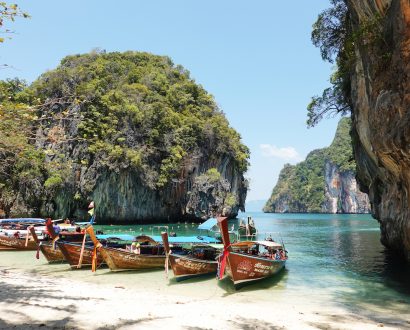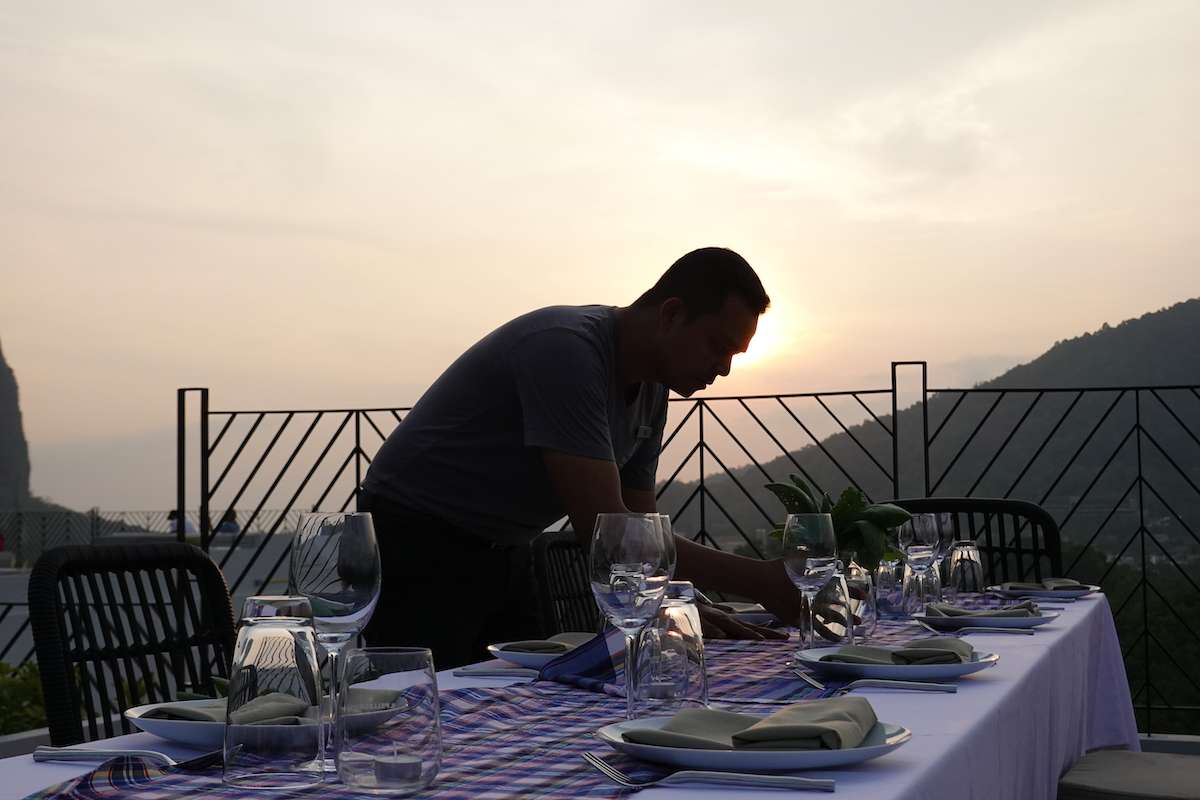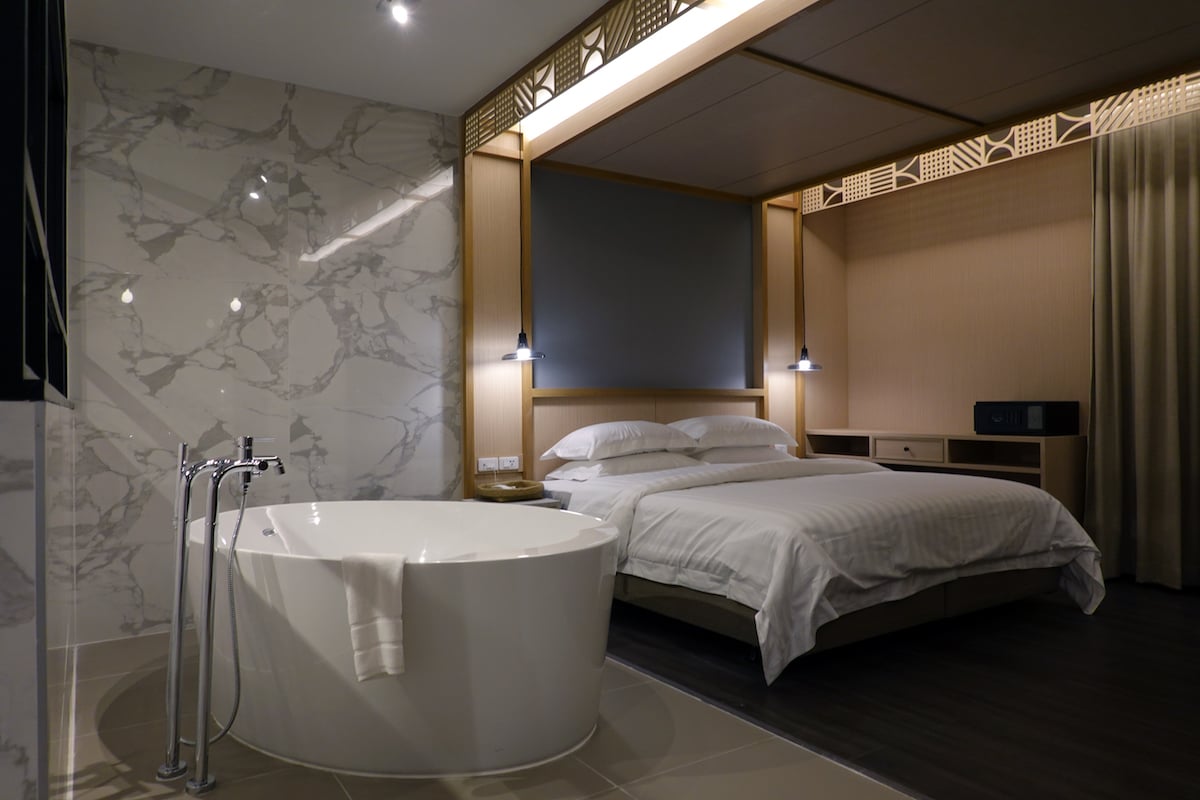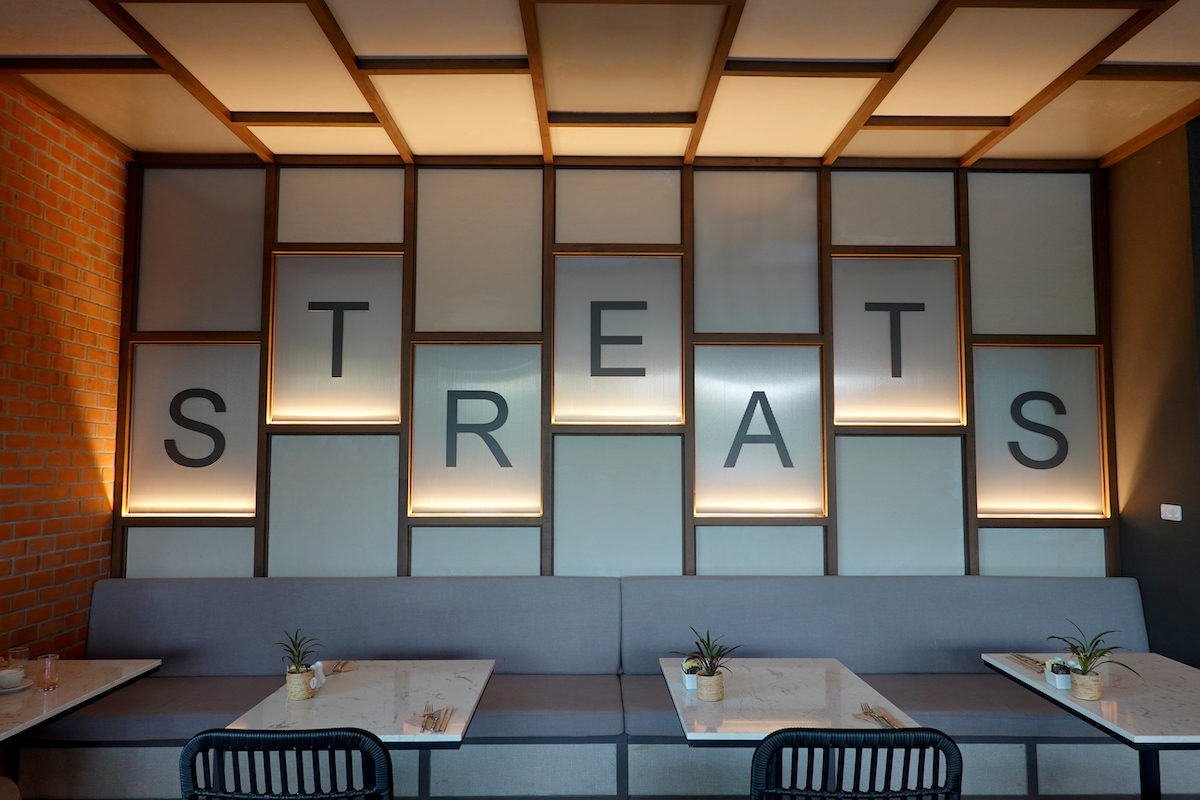Anana Ecological Resort, Krabi: the new eco kid on the block

The scream woke me up. My unblinking stare searched the ashen haze of dawn. Silence. I slipped back into my slumber, until another siren-like yowl propelled me from my pillow. I staggered towards the window, eyes squinting between the crack of the curtains, wondering what on earth was going on.
Cloaked by a cape of thick jungle where screeching gibbons reside, a brand-new retreat is growing. Southern Thailand’s first 5-star eco resort, corked into Krabi’s limestone cliffs, is putting out new shoots. Opening its doors in December 2018, it’s proving as fascinating as its entrepreneurial hotelier: Wolfgang Grimm AM.
Awarded for his tourism, education, environment and community leadership, Grimm made Thailand his home in 2012. Referring to himself as an ecopreneur, Grimm envisions his new resort becoming the region’s leader in sustainable tourism initiatives. Green Globe-certified, plastic-free Anana Ecological Resort is working in line with the United Nations Sustainable Tourism mandate.
But it’s what’s at the foot of the building that impresses most. Just outside the terrarium vase-decorated foyer is Anana’s biodiverse permaculture farm.



Sustainable farming
Alongside adobe earth-brick buildings, an edible landscape spirals out from a central bamboo yoga shala into a maze of organic goodness. Says Wolfgang: "We need to progress from being dependent consumers to independent and responsible food producers." Adjacent to the compost and biogas corner, self-sustaining veggie patches are sown with companion plants, arranged strategically for synergistic ecology.
Raised garden beds are divided into groups: pumpkin, dill, oregano and watermelon in one patch; bok choy, kale and Swiss chard in another. Crocheting a trellis are 30-centimetre-long snake beans. Thai curry staples, gourd and basil, are in abundance, while wet and dry rice crops-rotate with sweet corn. Vertical timber herb condominiums rise above young pineapples (the inspiration for the resort’s name). And Anana’s self-sustaining coffee plantation will soon start producing beans.
Much of this smorgasbord, along with local organic farm supplies, ends up on diners’ plates at the resort. Streats restaurant dishes up traditional Thai street food including kanom jeen and khao phad gai. And Coopers vegan kitchen serves a wholesome gRAWnola, and raw chocolate cake – of the guilt-free cashew, date and cacao kind.
Community-based tourism
The resort promotes community-based excursions. At Krabi River Marina, I boarded a traditional ruea hang yao (long-tail boat). Bangkok-based artist, Yuree Kensaku, painted it in vibrant colours for the inaugural Thailand Biennale (held in Krabi in 2018).
Cruising the Krabi River was a slideshow of nature, wildlife, art and culture. Our guide Winai pointed out brown-winged kingfishers, the striking twin peaks of Khao Khanap Nam, an overwater village of bungalows on stilts, and the 278-metre-high Wat Tham Sua (Tiger Cave Temple), said to have more than 1,200 thigh-busting steps leading up to its golden statue of the Buddha.
At the mouth of the Krabi River, we reached Koh Klang island and its car-free Muslim fishing community maintaining a traditional lifestyle. Tourism now supplements the subsistence-farming islanders. After lunching at their Kanabnam View Seafood Restaurant & Fish Farm where mudskippers wade, I jumped onto a motorised trishaw.
Passing sangyod rice farmers and grazing water buffalo, we reached a honey farm, to be joyfully welcomed by the locals (and their goats and chickens). They showed off their beehive, offering us honey-infused drinks in coconut shells as carefree children raced around while women hung indigo tie-dyed sarongs up to dry.
Joining a batik arts cooperative, I watched fascinated, as wax imprints were stamped on fabric, which I then painted over in various colours. Such meaningful moments stick.
On another day, Anana had me join low-carbon-footprint tour operator Krabi Spesialisten. The group collaborates with Trash Hero Ao Nang, which runs weekly beach clean-ups and manages the Refill My Bottle water stations installed throughout local communities. On boarding our boat, the guide gifted us with plastic-free Trash Hero water bottles before being whizzed to the islands.
Our long-tail, with its prow decorated in scarves in the colours of the national flag, headed off to the Koh Hong archipelago in Than Bok Khorani National Park. Island-hopping between rainforest garlanded mounts erupting from the Andaman Sea, included lunching at a low table on a bamboo beach mat at deserted Pak Bia island, where we enjoyed a satisfying buffet.
Arrival at Koh Hong brought breathtakingly beautiful striated cliffs. But its inner lagoon instilled the most awe. Inching through the 10-metre crack in the karst limestone terrane, we sat bobbing in the lagoon’s emerald belly as if in a fantastical fairytale setting.
World-first: solar-powered long-tail gondola
Wolfgang Grimm AM (in conjunction with German boat engineers Torqeedo and Hans Chalomark) has introduced to Thailand the world’s first electric (solar-powered) long-tail gondola. While preserving the maritime heritage of the noisier traditional long-tail boat (powered by diesel or petrol), it will reduce the vessel’s carbon footprint. I was lucky to be one of the first to ride its prototype. Skippered by a local, we steered through the tranquil mangrove-lined canals around Koh Klang, where otters and nocturnal mangrove vipers hide. Between shady forest branches, long-tailed macaques fished for crabs undisturbed on the most peaceful river cruise I’ve ever experienced. Its larger 6-seater version will officially launch in mid-2019 when Krabi Spesialisten will run its eco tours.
Getting there
Thai Airways International flies from Sydney, Melbourne, Brisbane and Perth to Bangkok for a connecting 80-minute flight to Krabi International Airport. Anana Ecological Resort (10 minutes from Ao Nang) is a half-hour transfer from Krabi’s airport
www.thaiairways.com
Staying there
Anana Ecological Resort features: 5 Spa Suites with a handheld and rain shower and organic pump dispenser toiletries; 6 Family Studios with twin bunk beds; and 48 Studio Rooms with ergonomic kapok-upholstered Thai daybeds. Guests can enjoy yoga classes in the Sky Garden or yoga shala, and a range of massages at Asana Sparadise, within which is a halotherapy Himalayan salt crystal grotto.
www.ananakrabi.com
For more luxury escapes, try one of the 10 most amazing holidays on earth.